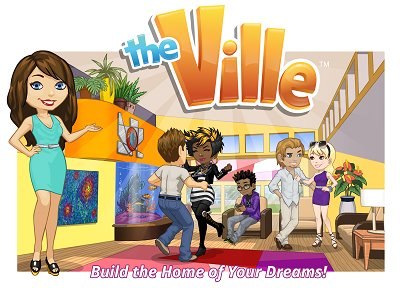EA is 'playing with fire' in Zynga suit, says legal expert
Santa Clara University School of Law professor says copying is rampant in gaming, and having a clear precedent set on gaming rip-offs could come back to haunt big publishers.
Earlier today, Electronic Arts announced it is suing Zynga, alleging the social gaming developer was guilty of copyright infringement for making The Ville, an "unmistakable copy" of its own The Sims Social. The full text of complaint is available online, so gamers can make their own assessments on the validity of EA's claims, but GameSpot went to Santa Clara University School of Law Professor Eric Goldman to get his own take on the case. Goldman specializes in Internet Law and Intellectual Property Law, and earlier this year was named as a North American "IP Thought Leader" by Managing IP magazine.

GameSpot: What's the actual legal threshold EA has to meet to make its case?
Eric Goldman: That's the million-dollar question. Copyright infringement requires two related concepts. First, the work has to be copyrightable. Second, the copy or the secondary usage has to take the protectable elements of that copyrightable original. So I don't believe EA is claiming that Zynga took the software code, and they're not saying the two outputs are identical. So in order to establish copyright infringement, EA is going to have to show that something less than the entire game is still protectable under copyright law, then that Zynga took too much of those protectable elements.
GS: Is there precedent for this, previous cases that set that bar?
"What I thought stood out in EA's complaint was that a lot of the things they alleged were copied, Zynga had made conspicuous changes to them."--Goldman
EG: I don't have a good way of organizing the game-related cases, though I'm sure there are a fair number of them. This general inquiry that I've described to you is standard for copyright law. This is something we deal with all the time across the board. The case I teach involves two plays with a Jewish-Irish couple and the shenanigans that manifest themselves when the couple gets together and norms and taboos are broken. When I describe it at that level, everyone is free to take that. But then when you start getting deeper into it, can you protect the individual characters or points in a storyline? Then a lot more judgment's involved.
What I thought stood out in EA's complaint was that a lot of the things they alleged were copied, Zynga had made conspicuous changes to them. Like in paragraph 94, the toilet versus the toilet paper. What Zynga took, and I don't think they're going to argue it, is that there's a thought bubble that's going to remind people about bathrooms. But the thought bubble is shaped differently, and it's a toilet [instead of] toilet paper. So can you take the idea of having a thought bubble to suggest that a character needs to go to the bathroom? I think that's free for everyone to take. You can't take the way it's expressed, perhaps. I leave it to you as an ordinary person in the industry, do you think they took too much of that. That's something that ultimately goes to the jury.
GS: Does it matter if there are these small tweaks if the underlying structure is the same? Does the sum of all the individual things, though they may be changed, does that add up to infringement?
"These kind of game rip-off cases are very difficult. They're hard to predict in advance. They tend to be quite costly."--Goldman
EG: That's a good question, and a nice way of framing it. Again, you're not going to get the cleanest answer that you would like. The idea of having a game environment where avatars can simulate their lives is free for everybody to take. Now in some of the massively multiplayer online role-playing games, the game has a script. There's a sequence of milestones the characters will go through as part of the gameplay. And that script is actually quite similar to the play about the Jewish-Irish coupling. That script can have protectable elements, that the same gameplay, milestones, and experiences could be protectable as well. Now I don't play The Sims, but based on the complaint, one of the beauties of it is that the game has no script. There's not a logical progression the characters have to go through from point A to point Z. Therefore, when you take away those kinds of milestones, you're back to the idea of having an avatar running a simulated life. And that's free for everyone to take, so it's harder to find a protectable element or expression in the gameplay, as such.

GS: When you talk about a script, it makes me think of the three-act structure in a play or movie.
EG: And that's free for everyone to take. But if the details within each of those acts are identical or substantially similar, we're going to say you took too much.
GS: Well, the Sims doesn't have a script, necessarily, but it's a series of underlying systems that interact with each other, and the game emerges from those interactions. And if you have something else with very similar underlying systems that interact in very similar ways, I would suspect that to be even more damning than having a three-act structure, something that's well-established and shared by many things in the genre, whereas the Sims has been distinctive.
EG: Let me characterize that argument in two different ways. Argument one is that because the Sims doesn't have an ordinary plot like a movie, play, or many games do, it's perhaps a less likely case to have that big picture structural infringement you were describing. Your point could be then flipped around, and I think it's a fair way of arguing it, that because it's so unstructured, anything that does overlap might be that much more questionable.
GS: Having looked through this, is your feeling that this case could go either way? That EA will prevail? That Zynga will prevail?
EG: These kind of game rip-off cases are very difficult. They're hard to predict in advance. They tend to be quite costly. I don't have a prediction on who got it right or who's going to emerge victorious.
"EA is playing with fire here. I don't think they really want to break new law and have an extensive interpretation of gameplay rip-offs."--Goldman
I will add that we don't see them all that often in the grand scheme of things if you think about how much money is on the table. We don't see a lot of lawsuits between the big players going after each other, and I think part of that is because copying of gameplay is rampant in the industry. I don't know EA's catalog well enough to know where they might be vulnerable on this point, but it's kind of the way the entire industry is built. All of the big players all have games in the same basic niches trying to provide the same basic gameplay. So there's disincentive for any big player to try to break new law about the copying of gameplay. They might win that case, but it might blow up on all the other things they try to do in the rest of the catalog.
However, we've been seeing a ton of litigation in the app space with apps going after each other for copying gameplay. But these are the small fries. These are in many cases new entrants to the industry, and they're not steeped in the industry's tradition of copying gameplay. And I see that as one of the growth areas for copyright litigation in the next few years. I think most of those are likely going to lose, but we'll get a lot more precedent irrespective of those [outcomes] as these cases work their way through the system.
GS: Those who live in glass houses shouldn't throw stones?
EG: Absolutely. And we don't normally see it, which is why this case might be more interesting than the usual one.
GS: Would you expect a settlement then?
EG: It would be a logical outcome because neither party wants to be proven wrong at the end. They both have incentives not to lose this case. So it's possible they'll just say, "Look, neither of us wants to lose. We can find out a way to come up with a win-win situation; let's do that." One solution would be Zynga could go through and reprogram the things EA complained about so they look less alike. EA says, "They changed their game." Zynga says, "We didn't really change anything." Everyone goes away happy. That would be a logical outcome.
EA is playing with fire here. I don't think they really want to break new law and have an extensive interpretation of gameplay rip-offs. I don't see how that's a win for them, so that's another reason they might be motivated to settle.
GS: Is there any sort of time frame these sorts of cases work on?
EG: The machinery of justice moves slowly. In all likelihood, we'll hear a response from Zynga in the next few weeks or months. We'll get their side of the story soon, but after that it could take months or more likely years to work through the system if it reaches its logical conclusion in the courts.
Got a news tip or want to contact us directly? Email news@gamespot.com
Join the conversation